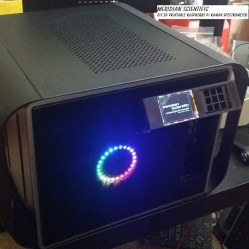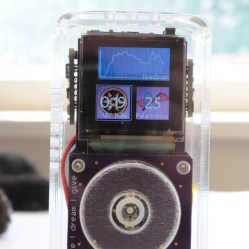Humanity is better when we work together. Nowhere is this more true than when it comes to Citizen Scientists — the concept that scientific advancement isn’t reserved to the trained professionals, but benefits when a larger population of thinkers collaborates with the community of trained researchers. This is the goal of the Citizen Scientist challenge round for the Hackaday Prize. Let’s build something that enables citizens to be scientists.
We’ll divide $20,000 evenly between twenty projects that target Citizen Scientists. Enter now and build your prototype by July 11th for your chance to win. Even better, if you are selected as one of those 20 finalists you’ll compete for the top prizes, $150k and a residency at the Supplyframe Design Lab in Pasadena. Second through fifth place finishers will get $25k, $10k, $10k, and $5k.
 You love design challenges and this one has powerful potential. We’ve seen builds like this in the finals during previous years of the Hackaday Prize. In 2014, RamanPi was recognized as the 5th place winner. The project seeks to reduce the expense of acquiring a Raman Spectrometer which is used for analyzing chemical substances. The design used parametric models for the optic jigs used by the machine. The idea is that a university could buy their own optics, adjust the models for the properties of those lenses and mirrors, then 3D print the parts to build the apparatus.
You love design challenges and this one has powerful potential. We’ve seen builds like this in the finals during previous years of the Hackaday Prize. In 2014, RamanPi was recognized as the 5th place winner. The project seeks to reduce the expense of acquiring a Raman Spectrometer which is used for analyzing chemical substances. The design used parametric models for the optic jigs used by the machine. The idea is that a university could buy their own optics, adjust the models for the properties of those lenses and mirrors, then 3D print the parts to build the apparatus.
 Also a winner in 2014, the Open Science Tricorder was recognized as the fourth place finisher. Based on the form factor and functionality of the iconic Star Trek technology, the Open Science Tricorder combines three or more sensor technologies with a user interface. It provides a hands-on experience for students learning about the properties of the world around them, and a handheld sensor suite to anyone interested in undertaking their own research projects.
Also a winner in 2014, the Open Science Tricorder was recognized as the fourth place finisher. Based on the form factor and functionality of the iconic Star Trek technology, the Open Science Tricorder combines three or more sensor technologies with a user interface. It provides a hands-on experience for students learning about the properties of the world around them, and a handheld sensor suite to anyone interested in undertaking their own research projects.
The Citizen Scientist challenge round begins right now. Get started on your build today and show us what you can do to solve a technology problem with your prototyping skills. Good luck!




















Totally going to enter this next one. I have some ideas for instruments that citizen scientists (*cough* hackers… excuse me) can use to measure things. Some of which are quite sensitive.
The modern view is that science is done under the umbrella of an institution (university, government, or corporate lab), but that’s not always been the case. Much of science was discovered by, what we would call today “hobbyists”. There’s even a wikipedia link for “Gentleman Scientist”.
(I suppose the best known might be Einstein, a patent clerk who published three papers that kickstarted quantum mechanics, relativity, and statistical mechanics(*).)
There’s a *lot* of potential in some of the HAD entries this year. For a shameless plug(**), check out the electrospinner project (link below). This project opens a sea of unexplored territory, and hackers could use this machine to make real discoveries. Electrospinning might find niche uses similar to 3d printing.
https://hackaday.io/project/10599-electrospinning-machine
I’m really liking the format of the HAD prize this year. Less of a monolithic ideal, more distributed opportunity.
(*) And also quite an inventor. Held 45 patents (with Leó Szilárd) for improvements to refrigerators.
(**) I put a deposit down on one
Why I actually need to build something for the Citizen Scientist Contest? Imagine Einstein would post his theory of relativity here after he discovered it…He would win nothing because he actually built nothing. And later win the Nobel Prize…
This was not the idea I had when I was putting the idea of a Citizen Scientist Contest to the .Stack: https://hackaday.io/page/1521-hackaday-science-prize-2016 a half year ago.
such is life, to have your ideas twisted for either others gains or to suit someone else’s narrative.
I’m pretty sure that building something isn’t actually required, despite what this article suggests. At least not according to the contest rules (https://hackaday.io/prize/rules-en), which even directly suggest that the prize entry could be an actual scientific study rather than just a device to help with science – in fact, to the extent that until now I’ve even wondered if the kind of stuff this article is suggesting was applicable!
Maybe you should go win the Nobel Prize then.
:o)
P.S.
Einstein did not win the Nobel Prize for the Theory of Relativity, but for the Law of Photoelectric Effect.
There is no Nobel Prize for mathematics.
You are right, but I wanted to point out Einstein’s work was purely theoretical, same for the law of the photoelectric effect.
I’m only interested if I can be a Citizen Mad Scientist!
Have you got any idea what a couple of decent henchmen (or at the very least, hench-assistant… erm… hench-intern… Igor…?) cost these days?!? Not to mention the hench-union safety regulations for labwork! Just having a banal shark tank can get you ruined, even if they aren’t even equipped with lasers! It’s a fool’s game these days, I tell you…
Do I get minions?
Robot minions. I currently have 2 sweeping the floor and one making precision plastic parts.